Coronavirus dashboard for July 22: the BA.4&5 wavette has (probably) peaked – by New Deal democrat No economic news today, so let’s update the COVID situation. As of yesterday, nationwide (dotted line below) cases declined slightly to 123,000. Cases have been slightly elevated from their previous 100-110,000 range for several weeks, but appear to have peaked. Deaths (sold line) rose slightly to 429, and are roughly 100 above their average for the prior 3 months: The above graph for the past year shows that the death rate per infection has steadily declined, particularly when you take into account the massive number of cases in the past 6 months where people rely on home testing and so the cases are never confirmed (probably around 2.5x
Topics:
NewDealdemocrat considers the following as important: covid, Healthcare
This could be interesting, too:
Bill Haskell writes Families Struggle Paying for Child Care While Working
Joel Eissenberg writes RFK Jr. blames the victims
Joel Eissenberg writes The branding of Medicaid
Bill Haskell writes Why Healthcare Costs So Much . . .
Coronavirus dashboard for July 22: the BA.4&5 wavette has (probably) peaked
– by New Deal democrat
No economic news today, so let’s update the COVID situation.
As of yesterday, nationwide (dotted line below) cases declined slightly to 123,000. Cases have been slightly elevated from their previous 100-110,000 range for several weeks, but appear to have peaked. Deaths (sold line) rose slightly to 429, and are roughly 100 above their average for the prior 3 months:
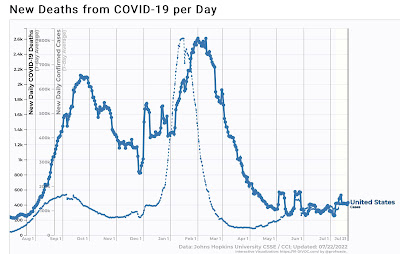
The above graph for the past year shows that the death rate per infection has steadily declined, particularly when you take into account the massive number of cases in the past 6 months where people rely on home testing and so the cases are never confirmed (probably around 2.5x the number of confirmed cases). Note that since the beginning of February almost 6 months ago, the US has weathered the BA.2, BA.2.12.1, and now BA.4&5 variants without a big (compared with original Omicron) increase in cases, and in general the case levels have been below even Delta at its peak. Nor did any of the new variants in the past 6 months substantially increase the number of daily deaths.
Cases in all four census regions of the US are either flat or declining (the West, thanks to California):
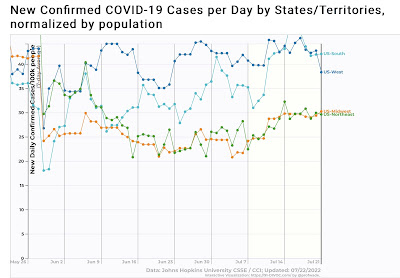
That isn’t just the case for the US. The below graphs by Trevor Bedford for various countries all norm deaths to infections at 1:1 for the initial 2020 wave. In all countries there are many multiples more infections for each death by now:
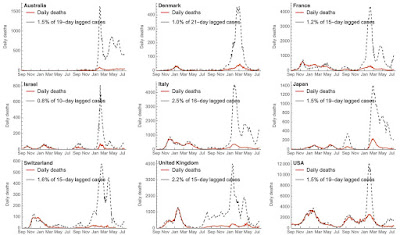
The situation isn’t quite so good as to hospitalizations, which have continued to rise in the US, to 45,200:
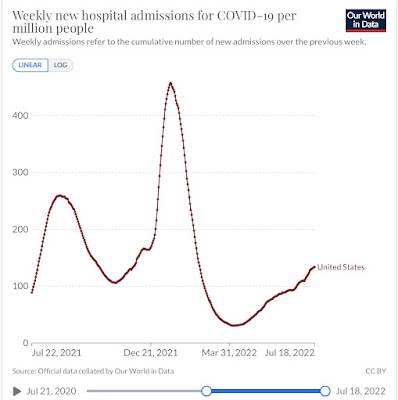
Dr. Eric Topol has highlighted a study out of Denmark that found worldwide higher hospital admissions due to BA.5, indicating it has more pathogenicity:

In the US, this may also reflect that most seniors have failed to get their second booster shot, so their protection has been fading even as the evidence has accumulated of the effectiveness of a second booster against this variant.
Speaking of variants, BA.4&5 constituted 91% of all new cases in the US by last Saturday, the remainder being almost all BA.2.12.1:
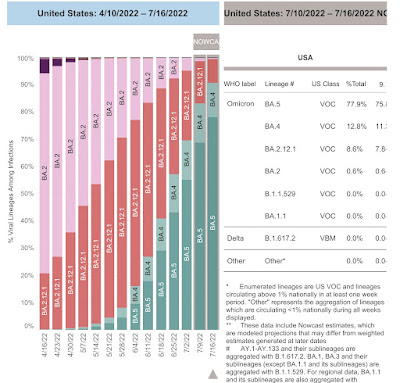
There was not much variation regionally:
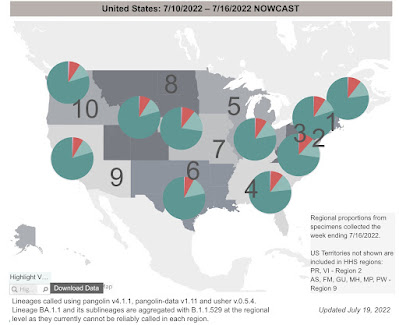
Globally the BA.4&5 wave appears to have peaked in the large majority of big countries, and I suspect we are at or just past peak in the US (note: wastewater reporting has not been updated in the past 9 days, so it’s impossible to confirm with that data). In South Africa, where BA.4&5 first appeared, cases actually are currently *below* their pre-Omicron levels.
Finally, BA.2.75 continues to appear in more countries on an isolated basis, with no evidence of any waves outside India. If it proves to be a damp squid, the US could get another respite.
